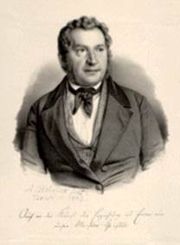Karl Justus Blochmann
Karl Justus Blochmann (born February 19, 1786 in Reichstädt ; † May 31, 1855 in Geneva ) was a German educator .
Life
Blochmann was the son of a country pastor and, together with his brothers Rudolf Sigismund Blochmann and Heinrich August Blochmann (1787–1851), was initially taught by a private tutor. After the early death of his father, he attended the grammar school in Bautzen . From 1805 he studied theology in Leipzig . In 1809 he went to Switzerland and worked for eight years as a teacher and educator at Johann Heinrich Pestalozzi's Institute in Ifferten . Pestalozzi's influence and teachings would accompany him for a lifetime. He had a lifelong friendship with other Pestalozzi's students, such as Karl Georg von Raumer or Theodor Schacht .
In 1819 he returned to Germany and became vice principal at the Friedrich August School in Dresden . At this Dresden citizen school he was unable to implement the reform pedagogical approaches that he had got to know in Switzerland. Therefore, he decided to found his own teaching and educational institution. He found support in this from the cabinet minister Detlev Graf von Einsiedel , who at this time was at the head of the royal Saxon government and was open to Blochmann's educational concept.
Einsiedel also campaigned for the new school with King Friedrich August . In 1824, the Blochmann Institute was opened on Grosse Plauische Gasse. In 1828 the Graflich Vitzthum'sche sex high school (also called Vitzthum'sches Familiengymnasium, a private school for the sons of the von Vitzthum family ) was affiliated to the Blochmann school.
The school now consisted of a grammar school and a secondary school, which the government granted the rights of a grammar school. Blochmann worked as its director until October 1, 1851. Even after his resignation as director, he continued to work as a religion teacher in the higher classes.
Blochmann died in Geneva in 1855 on a trip.
family
He married Ottilie Schnorr von Carolsfeld , the daughter of the painter and Leipzig Academy Director Veit Hanns Schnorr von Carolsfeld (1764–1841) and Juliane Lange near Leipzig .
Act
Blochmann was one of the most talented educators of his time. He was one of the first to spread Pestalozzi's concepts in Saxony. He concentrated more on practical implementations than on new theories. He took into account modern educational elements and educational needs such as the teaching of new languages and natural sciences also at high school.
Blochmann attached particular importance to the training of younger teachers who lived through their pedagogical years there. These include, for example, Carl Eduard Hering , Arnold Dietrich Schaefer , Alfred Fleckeisen , Wilhelm Crecelius , Julius Adolph Stöckhardt and Rudolf Kögel .
In 1861 the Blochmannsche Institut was renamed Vitzthumsches Gymnasium .
literature
- Friedrich Christian Paldamus: Blochmann, Karl Justus . In: Allgemeine Deutsche Biographie (ADB). Volume 2, Duncker & Humblot, Leipzig 1875, pp. 709-711.
- Herbert Schönebaum: Blochmann, Karl Justus. In: New German Biography (NDB). Volume 2, Duncker & Humblot, Berlin 1955, ISBN 3-428-00183-4 , p. 307 f. ( Digitized version ).
- Blochmann, Karl Justus, "Heinrich Pestalozzi: Traits from the picture of his life and work according to self-testimony", views and communications from Karl Justus Blochmann, Gressler, Langensalza, 1897
- Kittler, GA, The Beginnings of the Pestalozzian Method in Saxony with particular consideration of Karl Julius Blochmanns, ed. Von der Sachsengruppe der Gesellschaft f. German education and school history, Schlingert & Püschel, Meissen, 1927
Web links
- Literature by and about Karl Justus Blochmann in the catalog of the German National Library
| personal data | |
|---|---|
| SURNAME | Blochmann, Karl Justus |
| ALTERNATIVE NAMES | Blochmann, Karl Julius |
| BRIEF DESCRIPTION | German educator |
| DATE OF BIRTH | February 19, 1786 |
| PLACE OF BIRTH | Reichstädt (Dippoldiswalde) |
| DATE OF DEATH | May 31, 1855 |
| Place of death | Geneva |
